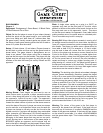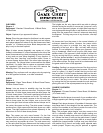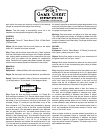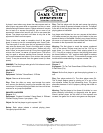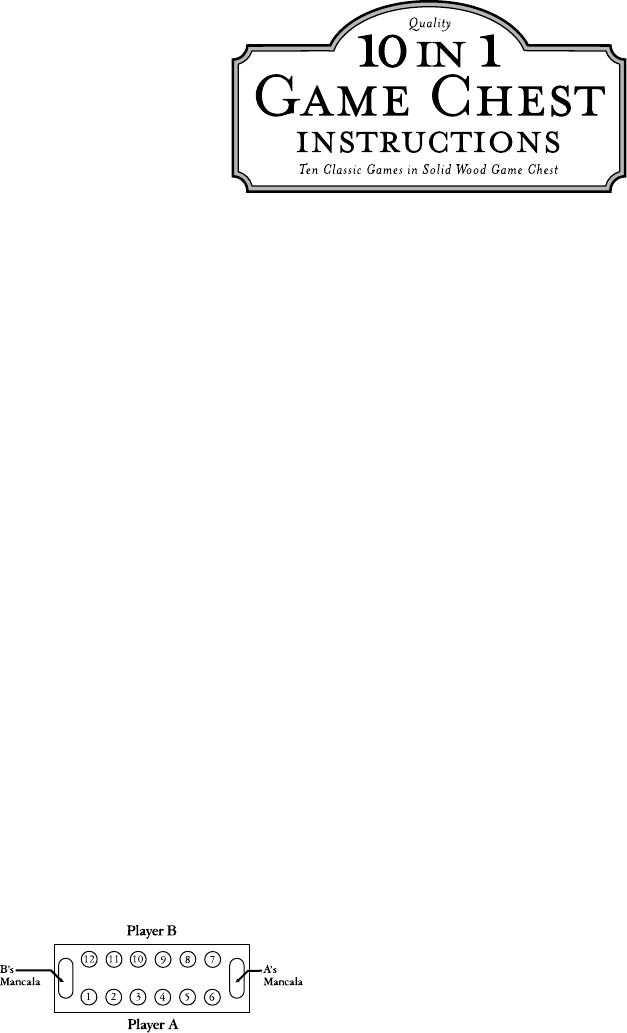
2
3
each other. No player can refuse to move out of his starting
triangle to prevent another player from winning.
Winner: The rst player to successfully move all of his
marbles into the opposite triangle wins the game.
COVER 21
Players: 2
Equipment: “Cover 21” Game Board, 2 Dice, 15 Red Disks,
15 Black Disks
Object: Be the player with the most pieces on the board
when all 21 spaces have been covered.
Play: Player with the black disks rolls rst. A disk is placed
over the combination that the player rolls. Players alternate
rolls, placing disks according to their combination that was
rolled. Only one marker can be placed per combination
rolled. Once all the 21 spaces have been covered, the player
with the most markers placed on the board is the winner.
MANCALA
Players: 2
Equipment: 1 Mancala Board, 48 small colored beads
Object: Be the player with the most beads in your Mancala.
Set-up: Place four beads in each of the bins numbered one
(1) through twelve (12) as shown in the diagram below.
Play: Player A’s bins are those numbered 1-6. Player B’s
bins are those numbered 7-12. Decide which player will play
rst by the ip of a coin. The rst player then picks up all of
the beads in one of the bins on her side of the board. [For
example, Player “A” would pick up the beads in any of the
bins numbered 1-6.] The player then proceeds by placing
one bead at a time in each of the bins counter-clockwise
around the board. If the last bead is placed in your Mancala
then you play another turn. You never place a bead in your
opponent’s Mancala, you skip it, placing the remaining
bead(s) in the following bin(s). [For example, Player A picks
up eight beads from bin 6, she then places a bead in her
Mancala and then bins 7, 8, 9, 10, 11, 12, but skips her
opponent’s Mancala and places the remaining bead in bin
1.] If the last bead is placed in an empty bin on your side of
the board, then you take all of the tokens in your opponent’s
bin directly opposite as well as the single bead placed in the
empty bin, and place them in your Mancala. Players may not
touch the beads to count them and once touching the beads,
the player must play them.
Winning: Play ends when one player’s six bins are empty.
The other player then places all remaining beads from her
side of the board into her Mancala. Players then count the
number of beads in their Mancalas. The player with the most
beads is the winner.
PACHISI
Players: 2-4
Equipment: “Pachisi” Game Board, 16 Tokens (4 each red,
blue, green, yellow) and pair of dice
Object: Be the rst player to move all your tokens around
the game board and into your “home.”
Set-up: Each player chooses four tokens of one color, which
must be set out on the corresponding color circle (or ower
shape) at each corner.
Play: No player moves a token until he has rolled a six (any
combination of the dice that adds up to six). If a player does
not roll a six, his turn is over and play is passed to the player
to the left. The rst player to throw a six takes one token from
the corner circle/ower and places it on the corresponding
color “start” area on the game board. In the next turn the
player uses his roll to advance his token that number of
squares clockwise around the path of the game board.
In each turn, players decide which of their four tokens to
advance, according to how they choose to count the dice.
The dice can be added together to advance one token,
or counted individually to advance two tokens. A player
can also use the count from one die and choose to ignore
the other. Whenever a six is rolled the player can choose
between getting another token out of it corner or advancing
a token already in play. Whenever a player rolls doubles, he
gains an extra turn. If a player rolls doubles three times in
a roll, he is penalized and his token closest to “home” must
return to the “start” circle.
When a player arrives on a square already occupied by an
opponent, the opponent’s token is “captured” and must be
returned to its colored circle/ower. In addition, the player
that was the “capturer” is given a 10-space bonus. He may
move any token forward 10 spaces. The bonus may not be
split between two tokens.



